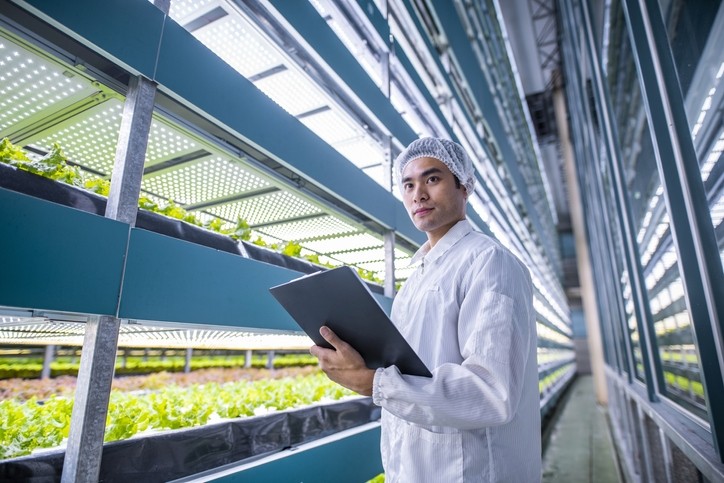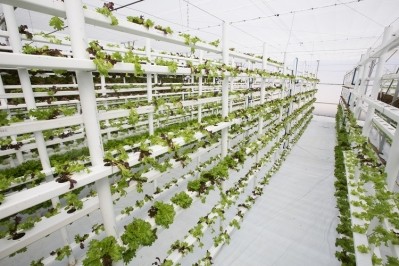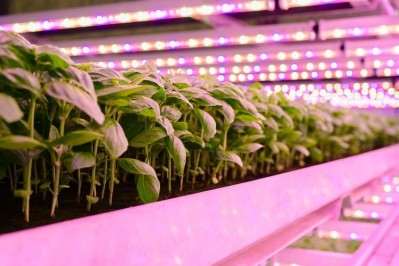What does AeroFarms re-emergence from Chapter 11 and AppHarvest’s liquidation say about the future of vertical farming?

Indoor farming captured the hearts of venture capital firms early in its development, thanks to its promise of improved sustainability, shorter supply chains, fresher produce available year around and, of course, patentable technology. But, the industry stumbled as operating costs remained high, questions about their energy use undercut their sustainability claims and high prices deterred consumer engagement.
When industry pioneer AeroFarms filed for voluntary Chapter 11 relief in June followed quickly in July by AppHarvest a ripple of concern for the category turned into a tsunami, despite the AeroFarms’ claims at the time that it would restructure and recapitalize “with limited disruptions to its ongoing core business operations.”
But now, three months later, the company is exiting from Chapter 11 after what it says was a “successful completion of its restructuring process.”
Combined with indoor leafy green grower BrightFarm’s announcement this morning that it is entering an exclusive licensing deal with indoor spinach grower Element Farms to better meet consumer demands, the two companies’ news could once again shift public and investor opinions about the segment.
But a judge’s greenlight last week for AppHarvest to move forward with liquidation weighs heavy.
[Editor's note: Want to learn more about the vertical farming industry's moment of truth? Join FoodNavigator-USA this November or our digital Futureproofing the Food System Summit, in which deputy editor Deniz Ataman sits down with Oishii to discuss opportunities and challenges in the segment as part of a larger conversation around food tech, food as medicine and the circular economy. Check out the agenda and register.]
AeroFarms enters ‘new chapter’ with strong demand, improved efficiency
With the help of existing investors, led by Grosvenor Food and AgTech (GFA), AeroFarms gained approval from the bankruptcy court to exit Chapter 11 and as GFA managing partner Stephan Dolezalek explained in a statement yesterday enter a “new chapter in the maturity and growth of [the company].”
The restructuring under Chapter 11 allowed AeroFarms to “substantially strengthen” its balance sheet by “injecting the necessary funds to reach profitability at the flagship operation in Danville, Va.,” the company announced yesterday. It added it will focus solely on the ramp up of the Danville Farm, including the recent completion of several automation projects, with the goal of reaching profitability early in the new year.
To help AeroFarms reach this ambitious goal, industry veteran Molly Montgomery, who is also a venture partner with GFA will take the helm as acting CEO and executive chairperson.
Montgomery will tap into her experience in the fresh food segment, including as CEO of Landec Corp, which provides fresh, packaged vegetables and salad kids, and her time as CEO of the fresh protein business CMM.
Also at the helm will be Guy Blanchard, who served as AeroFarms’ chief financial officer for nine years and added company president to his title in June.
AppHarvest moves forward with liquidation
While AeroFarms’ path forward offers an injection of much-needed optimism, the segment still faces significant challenges as illustrated by Kentucky-based greenhouse company AppHarvest Products’ very different outcome.
A month after AeroFarms filed for bankruptcy, AppHarvest followed suit with the intention of selling its farms to investors with the intention of keeping them operational and minimizing disruption to employees.
Last week, a Texas bankruptcy judge approved the company’s plan to proceed immediately with liquidation with a portion of the assets from selling its Richmond and Morehead, Va., greenhouses to Equilibrium, an Oregon-based investment firm, and its Somerset farm to Netherlands-based CEA Bosch Growers.
Strong consumer demand for indoor farmed produce
Despite the turmoil in the space, consumer – and by extension investor – interest in vertically grown produce remains strong.
According to market projections, the vertical farming sector is predicted to grow at a compound annual growth rate of 27.3% to $27.42bn in 2030 from $5.05bn in 2023.
These projections, alongside necessary step-changes in the segment give investors like Dolezalek confidence in the long-term viability of indoor farming and AeroFarms specifically.
“As an investor dedicated to creating a more sustainable global food supply chain, we see vertical farms as a critical part of the solution and are now focused on efficiently scaling our operations to deliver a market-leading product through ha profitable business model,” Dolezalek said.







